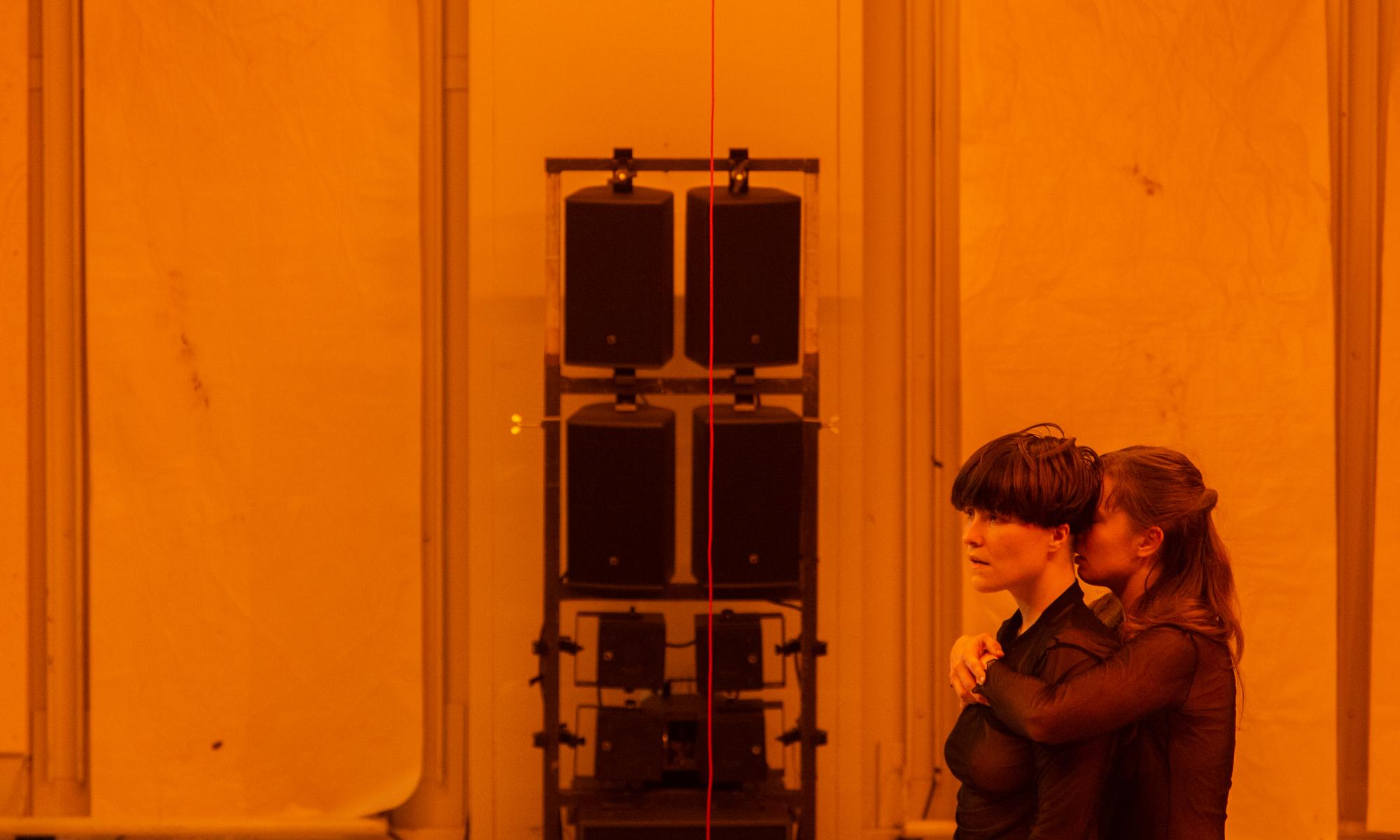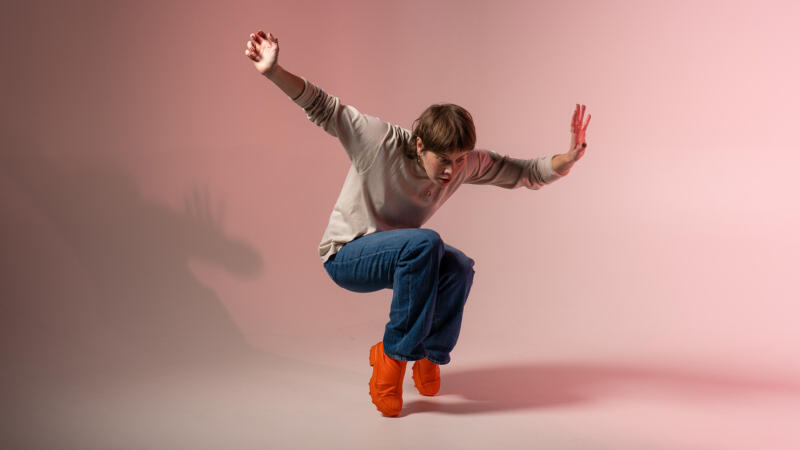Choreography, master
Develop your artistic voice and articulate your research to be able to contribute to society and work as an artist of the future.

Why study here?
The programme consists of two years of full-time studies that will help you develop your artistic and research skills and knowledge. You will grow your critical awareness and understanding of contemporary choreography, its practices, strategies and discourses, as well as the interactive relationship between art and society.
In the 2025 intake we have two different study options in choreography:
- Artistic practice and research
- Theoretical research.
Content and objective of the programme
The choreography programme leads to a Master of Arts (Dance) and consists of two years of full-time studies. The programme (120 cr) includes studies on choreography and personal artistic projects, contextual and theoretical studies, joint studies with other MA programmes, optional studies and an MA thesis. Our focus is on current approaches and methodological questions in choreography and performance, discourses on society and art, as well as on the work environment of an artist. Your own artistic projects and research questions play an important role, as well as collaborations with students from other degree programmes.
Our prevailing mode of study is research-oriented. The overall pedagogy emphasises the thematic trajectory of each student, supported by critical, reflective, analytical and explorative discussions with peers and teachers.
Collaborations and international mobility
We collaborate with other degree programmes of Uniarts Helsinki as well as with the Performing Arts Research Centre (Tutke). We also have an active relationship with professionals and alumni: we welcome visiting artists and researchers.
We are an active member of the Nordic Choreographic Platform (NCP), a network of master’s degree studies in choreography in Danish National School of Performing Arts (DASPA), Oslo National Academy of the Arts (KHIO) and Stockholm University of the Arts (SKH). Erasmus exchange is also available for students and staff.
New study option: Theoretical research in choreography
Students of the theoretical research option will deepen their analytical understanding of choreographic premises, potentialities, and various discourses while working alongside the artist-practitioner students. The graduated students might work, for example, as dance dramaturgs, researchers, curators, journalists, or facilitators in art-based community projects or continue their studies in a third cycle in doctoral studies.
Theoretical research in choreography option students will follow the tuition according to their personal study plan (PSP) created at the beginning of the studies but will also work alongside the artist practitioners in joint courses. They will also integrate alternatives to artistic productions and workshops.
If a student has been admitted to the option for theoretical research in choreography their study path will differ as follows:
1) During the Approaches to Choreography and Artistic Practices instead of producing a self-performed solo, these students will write a research essay or have a live presentation of their research project.
2) The courses Orientation to Artistic Collaboration and Artistic Collaboration Project will be completed as an alternative project (see details in curriculum).
3) There is no assessed artistic component in the MA thesis, but the student will complete the thesis as an assessed written theoretical study or a media–based artistic research project (see details in curriculum).
Study option: Artistic practice and research
Studies in Artistic practice and research option include individual artistic projects that focus on different approaches to choreography, artistic research, and collaboration.
Solo work
The studies in the first year’s autumn focus on different methodological and theoretical approaches to choreography and composition. During the course Approaches to choreography and artistic practices the students will explore and develop their own choreographic practice, their ability to research the framed subject or approach and share their artistic research processes in a rehearsal studio environment at the end of the semester.
Artistic Collaboration Project (ACO)
In Artistic Collaboration Project (ACO) the students will work in a multidisciplinary artistic collaboration with students from several different degree programmes: BA in Dance, MA students in Lighting Design, Sound Design, Scenography, Dramaturgy, and Dance Performance from the Theatre Academy, and Costume Design from Aalto University. ACO performances will be presented at the very end of the first year studies in the end of May. Read more about ACO.
Artistic part of the master’s thesis
In the artistic part of the master’s thesis students show that they can perform independent artistic work that covers all the stages of a choreographic process and gives a picture of the student’s ability to work as a professional choreographer and of their potential to discover their quality as artists. Please see more details in the study guide master’s thesis.
Theoretical framework for both study options
Theoretical studies provide a place to reflect on, explore and research topical discourses, methodologies, and conceptual tools within choreography and performance and in relation to larger societal and philosophical contexts. In the theoretical studies we acknowledge art as a significant historical, cultural, contextual and situated practice that reflects and promotes diverse societies. In the studies we focus on investigating the multiple ways choreography, dance and performance operate and create meaning as well as the conditions and environmental frameworks in which choreographers are working. One particular research focus is on the complex relationships between the conceptual frameworks and the material, performative actualisation of choreographic propositions.
The studies consist of modules Perspectives on history and theory of choreography and performance, Artistic research and Art and society.
Teachers
Our teachers are experienced experts in their field. In addition to the permanent teaching staff, the programme welcomes guest teachers and artists from both Finland and abroad.
Doctoral studies
A master’s degree gives eligibility to complete a Doctor of Arts (Dance) degree, for example, as a third-cycle degree. Doctoral studies in dance are offered by the Performing Arts Research Centre (Tutke).
Find out more
Admissions guide
Application instructions for this programme haven't been published yet.
Target degree and length of study
Master of Arts (Dance)
2 years
Application period
No admission in 2026. Next possible time to apply will be announced later.
Application languages
English
Read more about language skill requirements
Tuition fee
From August 2026, the annual tuition fee is € 28,000 for students who are studying in English and come from outside the EU and EEA countries.
Supervising teacher
Kirsi Monni
Professor
Jana Unmüssig
Lecturer
Unit
Ask about applying
teak.admissions@uniarts.fi
Ask about the programme
Join an online Q&A session during autumn 2024 to learn more about studies and admissions.
Max catalogue: students and alumniWhy study here?
The programme consists of two years of full-time studies that will help you develop your artistic and research skills and knowledge. You will grow your critical awareness and understanding of contemporary choreography, its practices, strategies and discourses, as well as the interactive relationship between art and society.
In the 2025 intake we have two different study options in choreography:
- Artistic practice and research
- Theoretical research.
Content and objective of the programme
The choreography programme leads to a Master of Arts (Dance) and consists of two years of full-time studies. The programme (120 cr) includes studies on choreography and personal artistic projects, contextual and theoretical studies, joint studies with other MA programmes, optional studies and an MA thesis. Our focus is on current approaches and methodological questions in choreography and performance, discourses on society and art, as well as on the work environment of an artist. Your own artistic projects and research questions play an important role, as well as collaborations with students from other degree programmes.
Our prevailing mode of study is research-oriented. The overall pedagogy emphasises the thematic trajectory of each student, supported by critical, reflective, analytical and explorative discussions with peers and teachers.
Collaborations and international mobility
We collaborate with other degree programmes of Uniarts Helsinki as well as with the Performing Arts Research Centre (Tutke). We also have an active relationship with professionals and alumni: we welcome visiting artists and researchers.
We are an active member of the Nordic Choreographic Platform (NCP), a network of master’s degree studies in choreography in Danish National School of Performing Arts (DASPA), Oslo National Academy of the Arts (KHIO) and Stockholm University of the Arts (SKH). Erasmus exchange is also available for students and staff.
New study option: Theoretical research in choreography
Students of the theoretical research option will deepen their analytical understanding of choreographic premises, potentialities, and various discourses while working alongside the artist-practitioner students. The graduated students might work, for example, as dance dramaturgs, researchers, curators, journalists, or facilitators in art-based community projects or continue their studies in a third cycle in doctoral studies.
Theoretical research in choreography option students will follow the tuition according to their personal study plan (PSP) created at the beginning of the studies but will also work alongside the artist practitioners in joint courses. They will also integrate alternatives to artistic productions and workshops.
If a student has been admitted to the option for theoretical research in choreography their study path will differ as follows:
1) During the Approaches to Choreography and Artistic Practices instead of producing a self-performed solo, these students will write a research essay or have a live presentation of their research project.
2) The courses Orientation to Artistic Collaboration and Artistic Collaboration Project will be completed as an alternative project (see details in curriculum).
3) There is no assessed artistic component in the MA thesis, but the student will complete the thesis as an assessed written theoretical study or a media–based artistic research project (see details in curriculum).
Study option: Artistic practice and research
Studies in Artistic practice and research option include individual artistic projects that focus on different approaches to choreography, artistic research, and collaboration.
Solo work
The studies in the first year’s autumn focus on different methodological and theoretical approaches to choreography and composition. During the course Approaches to choreography and artistic practices the students will explore and develop their own choreographic practice, their ability to research the framed subject or approach and share their artistic research processes in a rehearsal studio environment at the end of the semester.
Artistic Collaboration Project (ACO)
In Artistic Collaboration Project (ACO) the students will work in a multidisciplinary artistic collaboration with students from several different degree programmes: BA in Dance, MA students in Lighting Design, Sound Design, Scenography, Dramaturgy, and Dance Performance from the Theatre Academy, and Costume Design from Aalto University. ACO performances will be presented at the very end of the first year studies in the end of May. Read more about ACO.
Artistic part of the master’s thesis
In the artistic part of the master’s thesis students show that they can perform independent artistic work that covers all the stages of a choreographic process and gives a picture of the student’s ability to work as a professional choreographer and of their potential to discover their quality as artists. Please see more details in the study guide master’s thesis.
Theoretical framework for both study options
Theoretical studies provide a place to reflect on, explore and research topical discourses, methodologies, and conceptual tools within choreography and performance and in relation to larger societal and philosophical contexts. In the theoretical studies we acknowledge art as a significant historical, cultural, contextual and situated practice that reflects and promotes diverse societies. In the studies we focus on investigating the multiple ways choreography, dance and performance operate and create meaning as well as the conditions and environmental frameworks in which choreographers are working. One particular research focus is on the complex relationships between the conceptual frameworks and the material, performative actualisation of choreographic propositions.
The studies consist of modules Perspectives on history and theory of choreography and performance, Artistic research and Art and society.
Teachers
Our teachers are experienced experts in their field. In addition to the permanent teaching staff, the programme welcomes guest teachers and artists from both Finland and abroad.
Doctoral studies
A master’s degree gives eligibility to complete a Doctor of Arts (Dance) degree, for example, as a third-cycle degree. Doctoral studies in dance are offered by the Performing Arts Research Centre (Tutke).

